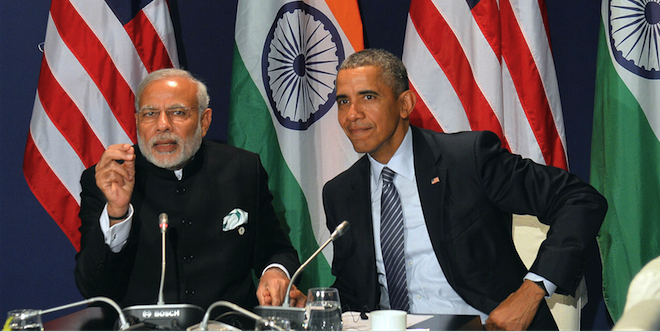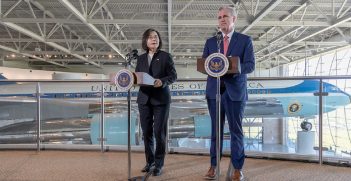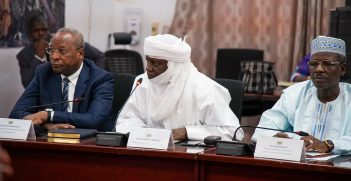What is India’s Policy on Maritime Asia?

Rapid developments in maritime Asia have regional analysts and scholars debating the new emerging security architecture. India and the role it can play seem to dominate much of these considerations. Calls for it to take an active security role are championed by the US, supported by Australia, Japan, Vietnam, Philippines and Singapore, among others.
How exactly is India responding to these developments and what is India’s policy on maritime Asia?
South China Sea (SCS)
Although approximately 55 per cent of Indian trade transits through the SCS, it remains an area of secondary concern for the Indian Navy. Additionally, India’s commercial collaborations with Vietnam on oil exploration and the Act East policy demand a certain degree of Indian presence in those waters. While the Indian Navy continues to transit through the SCS, India’s approach until recently has been to refrain from making any direct comments on the issue. This is in line with its larger foreign policy to not intervene or comment on disputes between other sovereign nations.
However, the Modi Government has been vocal in calling for a peaceful resolution on the matter and has engaged interested parties, such as Vietnam and the Philippines, in discussion on the issue. The change in its approach underlines an ongoing shift in maritime policies, which may have encouraged other nations to prod India further. Washington is now encouraging India to carry out patrols to challenge Chinese unilateral claims in and around the islands. Responding to increased media reports on the topic, the Indian Ministry of Defence released a statement calling the reports “speculative” and reiterating that New Delhi will only join an international military operation under the UN flag.
For India to conduct such an operation, it would have to first undergo a stronger and bolder foreign policy shift; second, it would necessitate an inherent boost in capabilities; and third, achieve a favorable position in its border disputes with China and Pakistan. In fact, pushing India publicly to demonstrate its concerns against developments in the SCS is far-fetched with possible consequences in Indo-US maritime ties. This is not to say that India does not worry or follow developments on the issue. It does, and it monitors it carefully. However, India has not yet reached a position where it can take a lead in challenging Chinese activities in the Western Pacific. As of now, it will continue to recognise these developments through statements, in bilateral dialogue and perhaps through stronger collaborations with Southeast Asian countries.
Indian Ocean Region (IOR)
Increasing Chinese presence in the IOR and Washington’s call on its friends and allies to uphold the current security environment in the area is inadvertently increasing expectations from India to share responsibilities. This change in the IOR coincides with India’s own renewed interest in playing a stronger role in the region. New Delhi has enjoyed the security arrangement under the US umbrella in the IOR. The environment, however, is changing and India is now taking active steps to reconnect with old friends and establish new relationships with the resident powers. The Modi government has reached out as far as the South Pacific Islands and is establishing a new security framework with Australia. Indonesia too is on its radar, as well as islands such as Sri Lanka, Seychelles and Mauritius.
The new maritime strategy indicates India’s political will to take on larger responsibilities and play a credible role in a framework that could potentially be multipolar in nature. This would be in India’s interest. In engaging with other nations of the region, it is demonstrating a will to step away from its non-alignment policy.
India continues to be primarily continental in its security strategy and will allocate most of its time and resources to issues along its northern border. Modi has most certainly injected a new level of enthusiasm in India’s maritime policy, but New Delhi is still far from being a strong maritime power. However, it is a goal that has been underlined and, should India continue with the same momentum, will be achieved.
In the IOR, India is also taking a lead in non-traditional security issues such as climate change, maritime piracy, HADR and blue economy. For a nation that has been fairly inactive in regional matters under the previous government, the current pace is encouragingly welcomed by other countries in the region. Although it is only a start, India is much more likely to make subtle changes than to take a drastic approach.
The focus on India playing its role to stabilise maritime Asia also worries New Delhi in terms of the expectations it may raise among key actors. India is conscious of being dragged into any form of quasi alliance or a block that might be tasked with targeting a particular set of issues. It will pick and choose the issues it will work on and the engagements it will foster.
Multilateralism
India today is comfortable with multilateral engagements in securing and stabilising the maritime domain. However, it is more willing to engage with powers it considers of its own level with similar interest areas. India is already cooperating with Australia and Japan, with maritime issues dominating the trilateral dialogue. India is more likely to step up its presence and activities through engagements in the form of dialogues, exercises, port visits and training programs. Collaborating with countries like Japan, Australia, the Philippines, Vietnam, Singapore and Indonesia fits well into India’s new outlook on maritime security.
Its relationship with the US is a crucial development for the region and has certainly come a long way as appreciated by both sides. However, New Delhi continues to be concerned about moving too fast with the relationship, especially on the maritime domain. While both New Delhi and Washington are keen to develop the relationship on the maritime front, India is hesitant to extend that relationship formally to include a third or fourth party.
India should continue to engage with regional countries and do so under multilateral frameworks. A multipolar world is in New Delhi’s best interests and India should demonstrate its political will to play the role of credible leader in tackling regional issues. India should also realise that it can engage without aligning with any country and that non-engagement will do more harm than good to its security interests in maritime Asia.
Darshana M. Baruah is a researcher in the Maritime Security initiative at the Observer Research Foundation (ORF). She is currently a Visiting Fellow at the ANU Crawford School of Public Policy and a 2016 National Parliamentary Fellow, Australia, working on maritime security issues.





